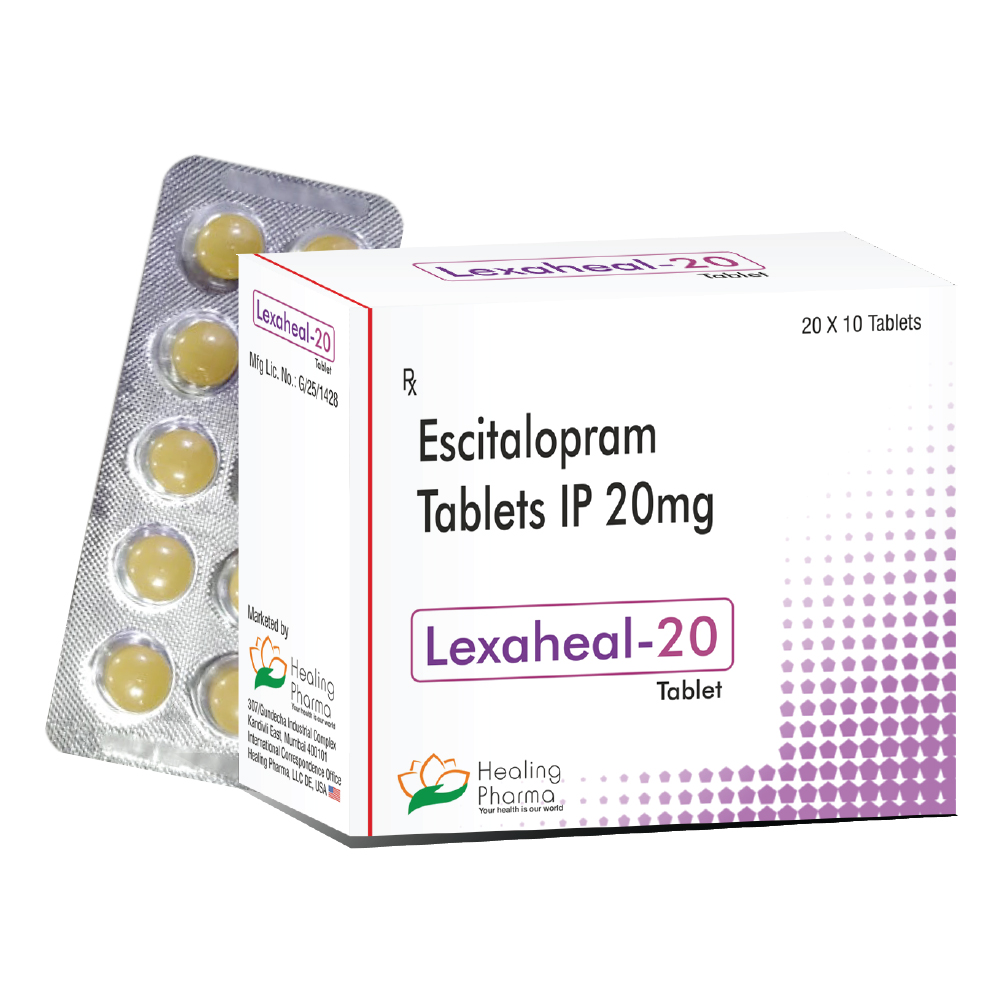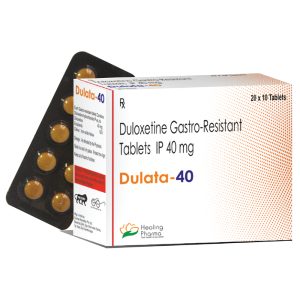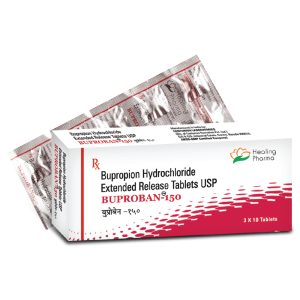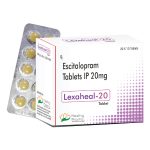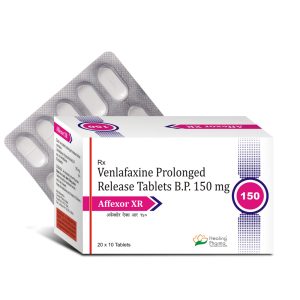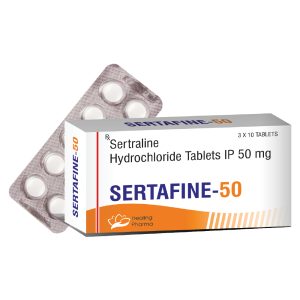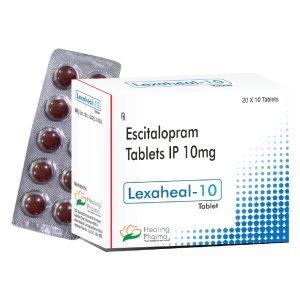| Strength | 20 Mg |
| Packaging Size | 10 Tablets |
| Brand | Lexaheal |
| Composition | Escitalopram |
| Manufacturer | Healing Pharma |
| Treatment | Antidepressants |
Escitalopram 20mg (Lexaheal 20) 20 mg tablet is a selective serotonin reuptake inhibitor used to treat depression, anxiety, and other mood disorders.
Drug = Escitalopram
Number of Pills Per Order = 10
Strength = 20 mg
Manufacturer = Healing Pharma
How To Take
This medicine may be taken with or without food. Try to make it at about the same time each day.
Escitalopram must be taken regularly for it to be effective. Continue taking Escitalopram even when you feel better. Do not stop taking it unless instructed otherwise, as stopping it suddenly could worsen your condition.
Take Escitalopram precisely as directed by your doctor or according to the instruction on the label. Do not take more or less than instructed by your doctor.
Dosage
Adult: Depression; Generalised anxiety disorder; Obsessive-compulsive disorder: 10 mg once daily, may be increased after at least one week to a maximum of 20 mg once daily.
Social anxiety disorder: 10 mg once daily, may be decreased to 5 mg or increased to a maximum of 20 mg once daily after at least one week, depending on patient response.
Panic disorder with or without agoraphobia: Initial: 5 mg once daily for the 1st week then increased to 10 mg once daily; may further increase the dose up to a maximum of 20 mg daily depending on patient response.
Missed Dose
If you miss a dose, skip the missed dose and return to your regular dosing schedule. If you often forget to take your medicine, let your doctor and pharmacist know.
Do not double a dose under any circumstances.
Overdose
Signs of overdose may include the following:
- Dizziness
- Tremor
- Agitation
- Nausea
- Vomiting
- Hypotension
- Tachycardia
- Somnolence
- Prolonged QT interval
- Arrhythmia
- Hypokalemia
- Hyponatremia
- Rarely, acute renal failure, serotonin syndrome, convulsion, and coma
Seek medical help immediately.
Contraindications
People with the following medical conditions should not take Escitalopram:
- Known QT interval prolongation or congenital long QT syndrome
- Unstable epilepsy
- Concomitant use of QT interval prolonging agents (e.g., pimozide) and MAOIs (or within 14 days of use)
Side Effects
Escitalopram may have the following side effects:
- Withdrawal syndrome
- Anxiety
- Suicide-related events
- Worsening of depressive symptoms
- Hypomania or mania
- Bleeding abnormalities (e.g., ecchymoses, purpura, hematoma, epistaxis)
- Akathisia
- QT interval prolongation
- Ventricular arrhythmia
- Torsade de Pointes
- Mydriasis
- Narrow-angle glaucoma
- Bone fractures
- Sexual dysfunction
- Rarely, hyponatremia
- Nausea
- Diarrhea
- Vomiting
- Constipation
- Dry mouth
- Fatigue
- Pyrexia
- Decreased or increased appetite
- Increased weight
- Arthralgia
- Myalgia
- Headache
- Dizziness
- Paraesthesia
- Tremor
- Restlessness
- Abnormal dreams
- Insomnia
- Somnolence
- Decreased libido
- Anorgasmia
- Ejaculation disorder
- Impotence
- Sinusitis
- Yawning
- Increased sweating
Potentially Fatal:
- Serotonin syndrome
- Suicidal ideation or behavior
- Hemorrhage
Warnings
Do not use Escitalopram in people with the following conditions:
- Heart rhythm disorder
Inform your doctor and pharmacist if you are taking or using any of these medicines:
- Linezolid
- Pimozide
- Warfarin
- Clopidogrel
- Dipyridamole
- Ibuprofen
- Diclofenac
- Naproxen
- Tramadol
- Chlorpromazine
- Haloperidol
- Thioridazine
- Sumatriptan
- Naratriptan
- Zolmitriptan
- St John’s wort
Inform your doctor and pharmacist if you are taking any other medicines, including herbal tonics such as traditional Chinese medicines, supplements, and non-prescription medicines.
This list does not include all medicines that may interact with Escitalopram.
How Does It Work?
Escitalopram, the S-enantiomer of the racemic citalopram, selectively inhibits the serotonin reuptake, thus potentiating serotonergic activity in the central nervous system. It has minimal effects on norepinephrine or dopamine reuptake.
Uses
Escitalopram is used to treat the following conditions:
- Depression
- Generalized anxiety disorder
- Obsessive-compulsive disorder
- Social anxiety disorder
- Panic disorder with or without agoraphobia
Special Precautions and Connected Warnings
Take special precautions if you have the following conditions:
- Patient with a history of seizure disorder or conditions predisposing to seizures (e.g., brain damage, alcoholism)
- History of mania/hypomania
- Suicide-related events
- Suicidal ideation
- Diabetes
- Bleeding tendencies
- Bradycardia
- Recent heart attack
- Decompensated heart failure
- Electrolyte disturbances (e.g., hypokalemia)
- Metabolic disease
- CYP2C19 ultrarapid or poor metabolizers
- Hepatic and severe renal impairment
- Elderly
- Pregnancy and lactation
- Avoid abrupt withdrawal
- Concomitant electroconvulsive therapy
- Avoid alcohol
Storage Conditions
- Store between 20-25°C.
- Store in a cool, dry place away from the reach of children.
- Do not use Escitalopram that is expired or out of date.

